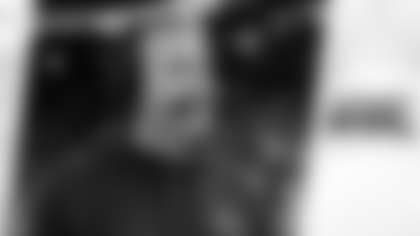The Bears struggled mightily on offense in a 10-3 season-opening loss to the Packers Thursday night at Soldier Field. Here are three things that stood out in the game:
(1) Coach Matt Nagy's film review of the offense's disappointing performance only confirmed what he had witnessed live and in-person from the sideline.
The unit was out of sync, out of rhythm and out of balance from start to finish, failing to score a touchdown for the first time in Nagy's 18 games as coach. The offense converted just 3-of-15 third-down plays (20 percent) and reached the red-zone on only one of 12 possessions.
"Offensively, it was what I thought it was—it wasn't good enough," Nagy said Friday. "Too many mental mistakes that we just typically don't make. These guys have got to understand that it's our job to fix that and I think that's why [general manager] Ryan [Pace] and I like to bring in high-character people, so that when times like this happen, we're going to fix it."
Nagy accepted much of the blame for an offense that produced its only points on Eddy Pineiro's 38-yard field goal on a drive that started at the Green Bay 36.
Asked about his play-calling, Nagy said Friday: "It wasn't good enough. I told the players that. I told them that last night in the locker room. It starts with me. I need to be better and I will be better and I'm going to demand that from myself, from our coaches and from our players."
Nagy acknowledged that the Bears need to be more balanced on offense than they were Thursday night on a stat sheet that showed 45 pass attempts and 15 rushes.
"When you hand the ball off 15 times in 65 plays, that's not enough balance," Nagy said. "It's one-dimensional. We didn't run the ball enough last night. So however we end up doing that, we need to as coaches figure that out. … In any offense, you've got to be able to get that run game established so it opens up other things and we know we need to be better there."
The disparity in pass-versus-run wasn't all on Nagy; the coach called several run/pass options (RPOs) that turned out to be pass plays based on what quarterback Mitchell Trubisky diagnosed from the defense.
(2) The Bears defense provided a major bright spot in an otherwise deflating loss, holding Aaron Rodgers and the Packers to just 10 points and keeping the game close throughout.
Feeding off a frenzied partisan crowd, the Bears defense opened the game by forcing three straight three-and-outs while limiting the Packers to minus-12 yards on nine plays. The unit excelled during most of the game, registering five sacks of Rodgers and allowing Green Bay to convert just 2-of-12 third-down opportunities (17 percent).
"I was really happy with the defense," Nagy said. "I thought they had a great game. A lot of really good things went on in the game. It's too bad that we let that get by with a performance like that by our defense.
"As bad as we were on third down, they were worse. Being the head coach, I've got to look at both sides. I can't let the defense feel like they didn't play well because the offense didn't play well because I'm an offensive-minded coach. I need to make sure that the defense knows [it excelled]."
The 10 points tied for the fewest the Packers have scored in Rodgers' 22 career starts against the Bears. Outside linebacker Leonard Floyd led the defense with two sacks—half of his total from all of last season. Defensive tackle Akiem Hicks, defensive end Roy Robertson-Harris and outside linebacker Aaron Lynch also recorded sacks.
Although the defense didn't generate any takeaways, it was an impressive debut under first-year coordinator Chuck Pagano.
"The big question [the media] had coming into this was, 'How are these guys going to do in coach Pagano's defense?'" Nagy said. "I think they showed last night how they're going to do. That's a good offense that they went against us and they gave us a chance. As bad as we were on offense, it was 7-3 with a chance to win the game at one point in the fourth quarter. You have to step back and understand from a 30,000-foot view that we were in a good position because of our defense last night."
(3) Nagy reiterated Friday why he kept the offense on the field on fourth-and-10 instead of trying a 51-yard field goal with the Bears trailing 7-3 late in the third quarter.
Trubisky scrambled up the middle for three yards, turning the ball over on downs. With the play starting at the Green Bay 33, it was beyond the yard-line that special-teams coordinator Chris Tabor had given to Nagy at halftime in relation to Pineiro's range heading toward the south end zone.
"That was past the exact number that we talked about for that depth," Nagy said. "You could do it, but I just didn't want to break our rule of saying where we're at.
"That's Chris—and it's not throwing blame on him. That's what he does and then that's what we go by. And just to make it clear, that's not some number that he puts his finger down on a piece of paper and says, 'Let's go on this number.' That's off of what [Pineiro] did in pregame.
"Is there ever any gray in that where you get to a point where it's a game-winning field goal? Yeah. There absolutely is. Then that's my decision."
Nagy revealed Friday there were other factors involved in keeping the offense on the field, namely that the Bears had so few scoring opportunities in the game and they would still be trailing even after making a field goal.
"We weren't down there very often," Nagy said, "so I was feeling like, 'You know what, we have an opportunity here to get one and to get a touchdown and put us up rather than put us down one.'"
Prior to the failed fourth-and-10 attempt, the Bears faced third-and-five from the 28 before their second delay of game penalty on the drive pushed them back to the 33. Nagy confirmed that the 28-yard line would have been within Pineiro's range.
The Packers took over at their own 30 after Trubisky's 3-yard run, whereas they would have started at their own 41 following a missed field-goal attempt.
"I felt like the percentages were better for us to go for it and get it and if we didn't get it, the defense is up with them having the ball there instead," Nagy said. "It was just a decision I made."















